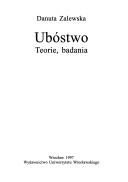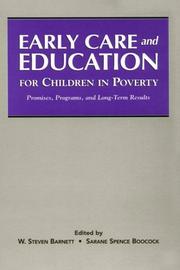| Listing 1 - 10 of 594 | << page >> |
Sort by
|
Book
ISBN: 0128176474 0128176466 9780128176474 9780128176467 Year: 2019 Publisher: Cambridge, Massachusetts : Academic Press,
Abstract | Keywords | Export | Availability | Bookmark
 Loading...
Loading...Choose an application
- Reference Manager
- EndNote
- RefWorks (Direct export to RefWorks)
Poor children --- Children of the poor --- Economically disadvantaged children --- Children --- Economic conditions
Book
ISBN: 1447352920 1447352912 1447352947 1447352890 1447352904 Year: 2021 Publisher: Bristol University Press
Abstract | Keywords | Export | Availability | Bookmark
 Loading...
Loading...Choose an application
- Reference Manager
- EndNote
- RefWorks (Direct export to RefWorks)
Exploring how children, young people and families cope with situations of socio-economic poverty and precarity in diverse international contexts, this book looks at the evidence of the harms and inequalities caused by these processes.
Poor children. --- Children --- Youth --- Poor families. --- Social conditions. --- Families --- Children of the poor --- Economically disadvantaged children --- Poor children --- Economic conditions
Book
ISBN: 9282618714 Year: 1990 Volume: vol *83
Abstract | Keywords | Export | Availability | Bookmark
 Loading...
Loading...Choose an application
- Reference Manager
- EndNote
- RefWorks (Direct export to RefWorks)
Poor --- Statistics --- -Disadvantaged, Economically --- Economically disadvantaged --- Impoverished people --- Low-income people --- Pauperism --- Poor, The --- Poor people --- Persons --- Social classes --- Poverty --- Economic conditions --- -Statistics --- Disadvantaged, Economically

ISBN: 832291640X Year: 1997 Volume: 1979 Publisher: Wroclaw Uniwersytet Wroclawski
Abstract | Keywords | Export | Availability | Bookmark
 Loading...
Loading...Choose an application
- Reference Manager
- EndNote
- RefWorks (Direct export to RefWorks)
Poverty --- Destitution --- Wealth --- Basic needs --- Begging --- Poor --- Subsistence economy --- Disadvantaged, Economically --- Economically disadvantaged --- Impoverished people --- Low-income people --- Pauperism --- Poor, The --- Poor people --- Persons --- Social classes --- Economic conditions
Book
ISBN: 0822978911 0822952904 1322183139 9780822978916 0822933713 9780822933717 9780822952909 Year: 1978 Publisher: Pittsburgh : University of Pittsburgh Press,
Abstract | Keywords | Export | Availability | Bookmark
 Loading...
Loading...Choose an application
- Reference Manager
- EndNote
- RefWorks (Direct export to RefWorks)
Includes Alaskan poems, p.42-51.
Poor --- Disadvantaged, Economically --- Economically disadvantaged --- Impoverished people --- Low-income people --- Pauperism --- Poor, The --- Poor people --- Economic conditions --- Persons --- Social classes --- Poverty --- United States --- American poetry

ISBN: 0585043515 9780585043517 0791436195 0791436209 Year: 1998 Publisher: [Place of publication not identified] State University of New York Press
Abstract | Keywords | Export | Availability | Bookmark
 Loading...
Loading...Choose an application
- Reference Manager
- EndNote
- RefWorks (Direct export to RefWorks)
Poor children --- Child care --- Education --- Social Sciences --- Education, Special Topics --- Children of the poor --- Economically disadvantaged children --- Children --- Education (Early childhood) --- Services for --- Economic conditions

ISBN: 1136244727 0415863392 1315007088 1136244654 9781136244650 0415176328 9780415176323 9781315007083 9781136244728 9781136244797 9780415863391 Year: 1958 Volume: v. 14 Publisher: Abingdon, Oxon : Routledge,
Abstract | Keywords | Export | Availability | Bookmark
 Loading...
Loading...Choose an application
- Reference Manager
- EndNote
- RefWorks (Direct export to RefWorks)
First published in 1998. Routledge is an imprint of Taylor & Francis, an informa company.
Slums --- Poor --- Disadvantaged, Economically --- Economically disadvantaged --- Impoverished people --- Low-income people --- Pauperism --- Poor, The --- Poor people --- Persons --- Social classes --- Poverty --- Slum clearance --- Housing --- Economic conditions
Book
ISBN: 1503603946 9781503603943 9780804799690 0804799695 1503608212 Year: 2020 Publisher: Stanford, CA : Stanford University Press,
Abstract | Keywords | Export | Availability | Bookmark
 Loading...
Loading...Choose an application
- Reference Manager
- EndNote
- RefWorks (Direct export to RefWorks)
Why are poor Americans so patriotic? They have significantly worse social benefits compared to other Western nations, and studies show that the American Dream of upward mobility is, for them, largely a myth. So why do these people love their country? Why have they not risen up to demand more from a system that is failing them? In Broke and Patriotic, Francesco Duina contends that the best way to answer these questions is to speak directly to America's most impoverished. Spending time in bus stations, Laundromats, senior citizen centers, homeless shelters, public libraries, and fast food restaurants, Duina conducted over sixty revealing interviews in which his participants explain how they view themselves and their country. He masterfully weaves their words into three narratives. First, America's poor still see their country as the "last hope" for themselves and the world: America offers its people a sense of dignity, closeness to God, and answers to most of humanity's problems. Second, America is still the "land of milk and honey:" a very rich and generous country where those who work hard can succeed. Third, America is the freest country on earth where self-determination is still possible. This book offers a stirring portrait of the people left behind by their country and left out of the national conversation. By giving them a voice, Duina sheds new light on a sector of American society that we are only beginning to recognize as a powerful force in shaping the country's future.
Patriotism --- Poor --- Disadvantaged, Economically --- Economically disadvantaged --- Impoverished people --- Low-income people --- Pauperism --- Poor, The --- Poor people --- Persons --- Social classes --- Poverty --- Attitudes. --- Economic conditions
Book
ISBN: 9780773556492 0773556494 9780773556485 0773556486 9780773556508 0773556508 9780773556515 0773556516 Year: 2019 Publisher: Montreal : McGill-Queen's University Press,
Abstract | Keywords | Export | Availability | Bookmark
 Loading...
Loading...Choose an application
- Reference Manager
- EndNote
- RefWorks (Direct export to RefWorks)
From the mid-eighteenth century to the early nineteenth century, the English Old Poor Law was waning, soon to be replaced by the New Poor Law and its dreaded workhouses. In Writing the Lives of the English Poor, 1750s-1830s Steven King reveals colourful stories of poor people, their advocates, and the officials with whom they engaged during this period in British history, distilled from the largest collection of parochial correspondence ever assembled. Investigating the way that people experienced and shaped the English and Welsh welfare system through the use of almost 26,000 pauper letters and the correspondence of overseers in forty-eight counties, Writing the Lives of the English Poor, 1750s-1830s reconstructs the process by which the poor claimed, extended, or defended their parochial allowances. Challenging preconceptions about literacy, power, social structure, and the agency of ordinary people, these stories suggest that advocates, officials, and the poor shared a common linguistic register and an understanding of how far welfare decisions could be contested and negotiated. King shifts attention away from traditional approaches to construct an unprecedented, comprehensive portrait of poor law administration and popular writing at the turn of the nineteenth century. At a time when the western European welfare model is under sustained threat, Writing the Lives of the English Poor, 1750s-1830s takes us back to its deepest roots to demonstrate that the signature of a strong welfare system is malleability.
Poor --- Disadvantaged, Economically --- Economically disadvantaged --- Impoverished people --- Low-income people --- Pauperism --- Poor, The --- Poor people --- Persons --- Social classes --- Poverty --- History --- Economic conditions
Book
ISBN: 0199959536 9780199959532 9780199372034 0199372039 9780199959525 0199959528 Year: 2014 Publisher: New York : Oxford University Press,
Abstract | Keywords | Export | Availability | Bookmark
 Loading...
Loading...Choose an application
- Reference Manager
- EndNote
- RefWorks (Direct export to RefWorks)
"The number of children living in families with incomes below the federal poverty level increased by 33 percent between 2000 and 2009, resulting in over 15 million children living in poverty. Some of these children are able to overcome this dark statistic and break the intergenerational transmission of poverty, offering hope to an otherwise bleak outlook, but this raises the question--how? In Fostering Resilience and Well-being in Children and Families in Poverty, Dr. Valerie Maholmes sheds light on the mechanisms and processes that enable children and families to manage and overcome adversity. She explains that research findings on children and poverty often unite around three critical factors related to risk for poverty-related adversity: family structure, the presence of buffers that can protect children from negative influences, and the association between poverty and negative academic outcomes, and social and behavioral problems. She discusses how the research on resilience can inform better interventions for these children, as poverty does not necessarily preclude children from having strengths that may protect against its effects. Importantly, Maholmes introduces the concept of "hope" as a primary construct for understanding how the effects of poverty can be ameliorated. At the heart of the book are interviews with family members who have experienced adversity but managed to overcome it through the support of targeted programs and evidence-based interventions. Student leaders provide unique perspectives on the important role that parents and teachers play in motivating youth to succeed. Finally, professionals who work with children and families share their observations on effective interventions and the roles of culture and spirituality in fostering positive outcomes. Excerpts from these interviews bring research to life and help call attention to processes that promote hope and resilience. This book will be invaluable for policymakers, educators, and community and advocacy groups, as well as scholars and students in family studies, human development, and social work"--
Poor children. --- Poor families. --- Resilience (Personality trait) --- Hope. --- Emotions --- Human resilience --- Resiliency (Personality trait) --- Personality --- Families --- Children of the poor --- Economically disadvantaged children --- Poor children --- Children --- Economic conditions
| Listing 1 - 10 of 594 | << page >> |
Sort by
|

 Search
Search Feedback
Feedback About UniCat
About UniCat  Help
Help News
News